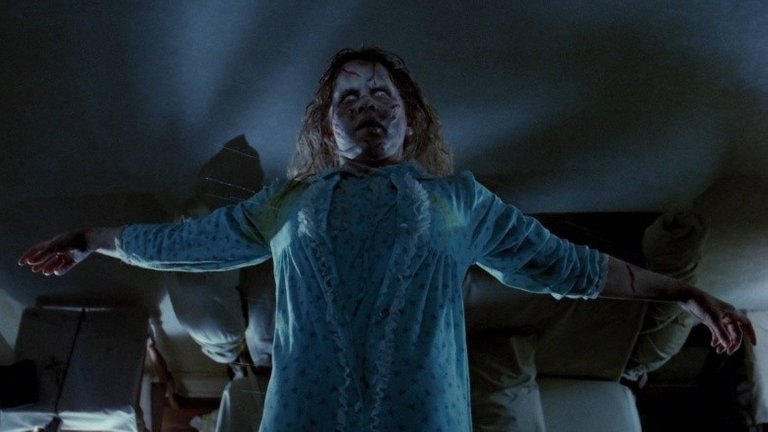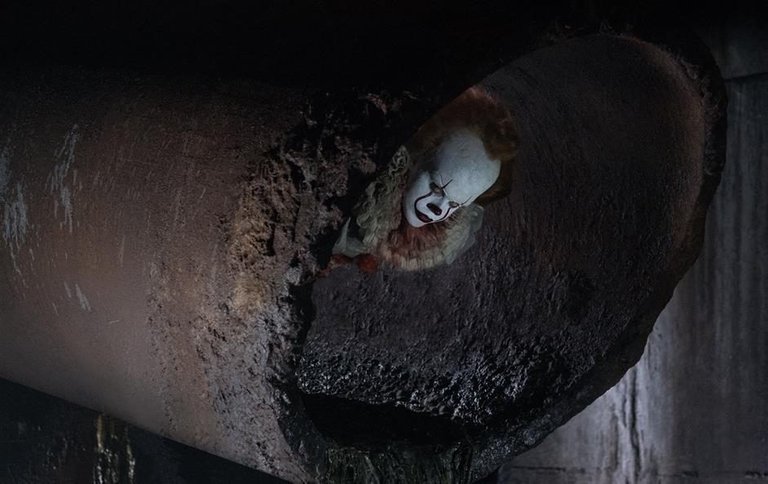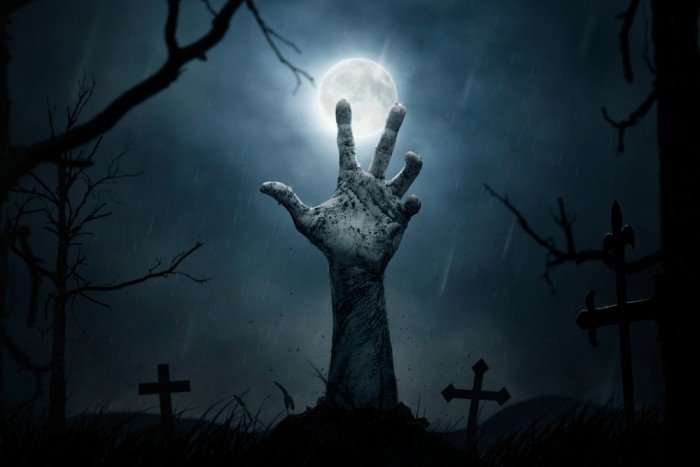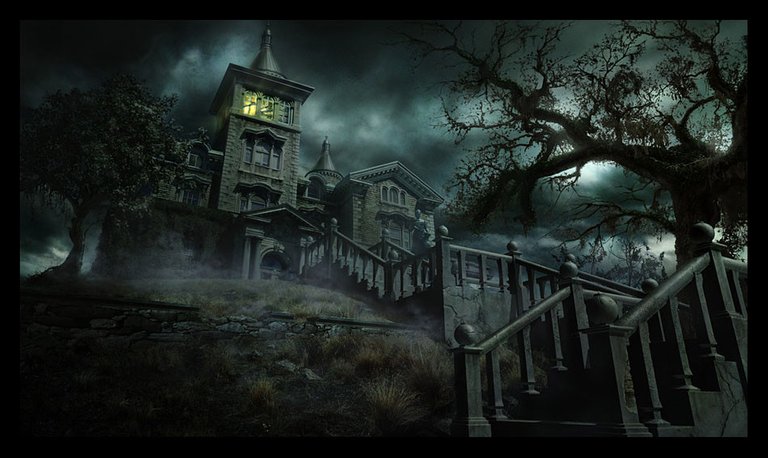In a town of only two hundred people, we had three churches—but that didn't help when the fire came. We stood shouting and praying as it jumped from house to house, but we received no answer from either heaven or earth. We'd been forced to defund our fire department as people moved away and the town sank further into debt over the last decade; there'd been some hope of gap funding to get us to the next fiscal year, but the November fire was burning that hope away right before our eyes. Lacking any other option, we turned to the Collective Entity.

It was actually my idea. I was one of only four recent college graduates that had actually returned to Malinta after escaping, so no one else even considered it. The only thing our town was known for was having elected as mayor an accused witch instead of burning her at the stake; it was to her artifacts in the mayoral building that I ran. In one of the glass cases was a scroll from 1880, and I'd memorized the text as an intrigued child. I broke that glass with a rock, carefully took the scroll, and ran back to Turkeyfoot Avenue where most of the townsfolk had gathered.
The debate over whether it would actually work was short. Malinda Elizabeth Bensing was a revered name by the old timers, and anyone younger was willing to try it regardless. The namesake of our town had not been a witch in the sense that she'd trafficked with Satan or demons; indeed, she'd claimed those evils didn't even exist. Instead, she'd been some strange sort of purveyor of very real human energies, and that was the primary power in the scroll. According to the text, if we overlaid our hands in a very specific tessellating pattern and all held the same thought in our heads, we could give our support and willpower over to a Collective Entity born of us.
By haunting firelight fueled by the homes and possessions of our community, we swallowed down our trepidation at the strange ritual and stood in the middle of Turkeyfoot Avenue in the manner described. It needed to work; it had to work. That night, I saw fear in the eyes of my neighbors, and for once I understood what it meant to be a part of a place. Like my friends, I'd dreamt of escape, but they'd had the money to actually do it. My life, therefore, was on the line just as much as any of these people. I gave my willpower—and, shockingly, I felt it drain forward through my arm.
Our tightly patterned knot of people began to glow; subtle light passed through our arms, flared in our fellows, and continued on stronger. As it reached the front, old man McCree gasped; the sum total pushed out through his chest, and he fell. No one ran to him, for all eyes were on the white glare floating slowly away from us.
I shouted, "The fire! Think about the fire!"
As one, we sent out our hopes to it, and it began to ascend. It began to take shape: flowing white robes, a golden halo, a benevolent face. It floated up and over the burning houses. It spread massive ivory wings. Then, rain began to fall.
But not from the sky—from beneath those spread wings.
Little by little, flaring pillars of orange dimmed to embers, and then went dark. We stared in amazement at the being that we'd created. It had actually worked! I'd once seen the ghostly Indian warrior on Turkeyfoot Creek Bridge when I'd been ten, so I knew the supernatural was at least somewhat real, but it absolutely astounded many of the others.

"It's exactly as I imagined it," one of the older women said in awe.
Another agreed, "Me too."
"It's an angel," yet another added.
Meanwhile, the other three college-grads and I rushed down to check on old man McCree. He was fine, but his hair had stood up straight on end, and touching him gave us static shocks. He stared at us with wide eyes and insisted he was alright and that we needed to let him alone.
The sky over our homes was dark again, and the heat of the fire had faded, so the chilled townsfolk began to disperse. The four similar-aged of us were left to go to Copper Bar & Grill and have a drink in startled silence. The bartender arrived shortly after us and served us with very few words before heading into the back; Ryan, Lily, and Courtney sat with me at a table.
I knew Ryan from our K through 12 school, and he'd always been a loudmouth meathead type, but now he had nothing to say and sat over his beer staring at the table.
Lily was our town's token Goth, and had never fit in with our staunch conservative atmosphere—yet she, too, had participated in the ritual. Her father's house had been next in the line of fire, and it had been saved. She broke the silence by saying, "How the hell did that actually work?"
I didn't know Courtney well. She'd been a late transfer to our town because of her family moving in, and then she'd gone off to college pretty quickly. "It's this town," she told us quietly. "Something like that would never have worked in a big city. You got one hundred percent of the people here to band together, and that's impossible anywhere else."
That was an interesting point. I responded, "So people would never believe us even if we tried to tell them."
She nodded sadly.
Ryan slowly lifted his head. He hadn't heard us. Instead, he said, "This is it. This is how we fix things."
Lily looked over at him in askance.
"We do it again," he elaborated. "Have it plow fields, grow crops. Save the town."
She shot back, "Forget farming. Let's make it construct a factory. We can sell electric cars."
The two immediately began to argue. Courtney and I watched for a minute or two before looking at each other with unspoken concern.
By the next morning, that concern had become full-blown reality. All the townsfolk were out in Turkeyfoot Avenue again, but not to put out fires. This time, they were arguing over what to do with the Collective Entity. Mr. Ellis, the owner of the bank, was at the head of the mob with his arms high trying to get people to calm down.
"Come on!" he shouted. "We can either work together and get something, or fight amongst ourselves and get nothing."
Different groups began yelling over each other; there were the three different church crowds, of course, who each wanted slightly different things; there were the farmers, like Ryan and his dad, and there were those like Lily that wanted to build the town into something more modern.
Next to me in the back, Courtney called forward, "Do we actually want different things, in the end? Don't we all just want to live peacefully and prosper? Why don't we do all those things?"
Ellis pointed at her and said, "Good idea! Someone get a table. And paper and pencil."
Someone suggested: "Well if it's gonna be official, we should do it in pen."
"Good idea, Earl!" Ellis motioned over the men who had grabbed a table from a nearby house, and they set it up in the center of the street, right on the pavement. "Someone got a pen?"
Widow Stephens offered a pen.
"Hey!" someone else complained. "That pen's got Trinity Lutheran on it."
"Yeah, and?"
"Well that's not fair. What about Malinta Memorial United Methodist?"
Ellis put a hand to his forehead briefly, then looked up and around. "Does anyone have a pen without any logos or words on it?"
My three new friends and I watched as they hammered out a Charter related to use of the Collective Entity. Everyone would get what they wanted in turn, but they spent several hours arguing about the order in which everyone would get what they wanted.
As dusk neared, they'd finally done it. They'd crafted a plan that all two hundred townsfolk could actually agree upon—and happily so. We had few enough and similar enough people that there was no outlying group left behind, and I imagined that was pretty wondrous. The other surprise, around the time darkness truly fell, was that the Entity did not need to be summoned again.

It appeared in the skies above us dimmer than before; drained, even, but it was still there.
Here was the first true test. Ellis read from the Charter; the first miracle would be to heal old man McCree's sick dog. His wife had died the year before and he'd fallen the previous night, so it only seemed fair. As one, the two hundred of us assembled there lent our support. Little sparks of white energy left each of us and went to the being in the sky, which grew back to full brightness and then disappeared in an umbrella-shaped flash of light over McCree's house.
His dog leapt through the dog-flap a few moments later and ran happily toward him with the energy of a puppy. It was a truly good thing to witness, and McCree cried and thanked us all profusely. That was it for the day, and we separated into our little groups again.
We were all smiling as we sat at Copper drinking, but I had to admit I was feeling a little tired. At first, I chalked it up to the day's lengthy debates, but I saw my friends yawning as well. Courtney said what we were all thinking: "Man, giving that energy away really took it out of me."
Huh, how about that.
It was a massive red flag that none of us paid the proper heed.
The next few nights we gathered to fix damage done by the fire; after, we still went to the bar for drinks, but that soon changed. After a week of minor miracles that everyone had agreed upon, I was too tired to stay out. I went home and immediately fell asleep in bed, only to awake as if I had a hangover anyway.
As I groggily stepped out, Courtney was on my porch with a coffee for each of us. "We have a problem."
I guzzled the hot coffee, winced at the morning sun, and nodded weakly.
There were already others gathering on Turkeyfoot by the time we walked there. They were tired, too, and much worse for the wear because they were older than us. Mr. Ellis was there with bags under his eyes and holding a discussion. He waved Courtney and me over as soon as he saw us. "Now here they are. Hey kids, you look better than we do, but is it safe to say you're feeling under the weather, too?"
We nodded. "Definitely."
"Well, then, it's no mystery what's happening." He sighed. "What we give to the Angel does come at a price. It ain't free. Therefore, we're gonna have to hammer out some sort of payment plan."
A few tired folk laughed, since Ellis was the town banker, but he hadn't been making a pun. "Look," he said. "You young ones bear it easier than us, so it's gonna come harder on you no matter how we slice it. Courtney, you work the Kwik Stop, don't you?"
She narrowed her eyes. "Yeah. Why?"
"Well how about you forget that, and just spend your days eating and exercising and generally getting well?" He looked at me. "You, too."
"What, like quit our jobs?" I asked, a little incredulous.
"You're still workin'," he replied positively. "Just for the whole town instead of just yourselves."
Wow. What a dick. I went to say something nasty, but Lily and Ryan arrived from opposite directions before I could, and Ellis gave them the same 'suggestion.'
At home, my parents immediately undercut my anger by telling me they were proud of what I was doing. Ellis had called them, and they understood and would support me with food and petty cash until the year or so of planned miracles was complete. Begrudgingly, I agreed.
And for a time, it actually worked out. I spent each day running, lifting weights, and eating carefully balanced diets. I got in shape and I felt great, at least until dusk, when the wind would be taken out of me in a basketball-sized orb of white light and I would be left winded, shaky, and weak. The older folk still gave, of course, but their contributions were the size of tennis balls or cherries. In return, I got to see whole buildings emerge from the ground in moments, and I got pats on the back and cheers from my entire community. For a time, Ryan, Lily, Courtney, and I were hardworking heroes.
But as the tasks grew in scope, so too did the energy required. By March, I was returning home to alternately guzzle Gatorade and throw up for hours. I didn't want anybody to see me struggling, least of all my parents, but I was reaching my breaking point. Not only was I physically ill every night, I hadn't had time for a social life in months, and I was beginning to feel cooped up in a prison with no walls.
When that dusk finally came that I had to hold up my hands in defeat and say I couldn't give, everyone else had gotten used to our new prosperity. Next to me, Courtney held her sides and nodded, too, wordlessly agreeing that she also needed a break.
Ryan's dad was there with a firm grip on his son's arm. "They've pushed back our miracle nights for 'emergencies' too many times. Our fields need fertilized. They can't just be left to dry out."
"It's fine," Ellis said to everyone. "We can all give a little more now and then, can't we?"
They couldn't. They got the mundane miracle done that night, but it eviscerated the older folk, sending them to their beds for the entire next day. They hadn't realized how onerous the burden had become.
But, strangely, they weren't more appreciative the next evening. I was feeling a tiny bit better, but they were sick and confused and angry. I tried to tell them, "Don't you see how hard we have to work to support all this for you?"
That just seemed to make them angrier, as if they didn't want to face what they were doing to us.
"You're just whining!" old man McCree shouted at us. Others jeered and agreed.
Lily flicked them off.
Widow Stephens spit on Courtney. "Lazy piece of crap."
Courtney stilled my sudden move forward with her left hand and pointed with her right. "Fine, screw you guys. We're not giving anything anymore."
Ryan urged us: "Come on guys, my family still needs a few more miracles."
"And how about the schedule changes on that?" I asked him. "Isn't it funny that they've spaced out what your farm needs until the very end? Almost like they made it so you have to be on their side."
He remained quiet but fuming.
Ellis' face seemed to change, then. "I didn't want to have to do this." He motioned toward us, and our two local cops started moving.
"Seriously?" I shouted at him, even as Courtney, Lily, and I backed up.
"The town needs these miracles," he proclaimed. "Or else it'll die. You're putting us all in danger with your selfishness."
I looked around for recognition of the absurdity of what he'd said, but the townsfolk were all of one face: angry. My parents were among them, glowering at me with fire. I looked to Courtney and Lily; our community had made one mistake in assigning us our duties: we were fitter than ever.

So, we ran.
The cops tried to get after us, but they had no idea how fast we'd gotten. They tried to chase us a bit, but by the time they gave up and returned to their car, we were long gone. We broke into a house, gathered clothes, bags, and food, and took to the open fields and forests around town. From there, we watched.
Our first fear was that they would use the Angel to find us or punish us somehow. We watched from deep in the trees that evening; when they shouted for retribution, the Angel darkened—not dimmed, but darkened, glowing grey rather than white. Fearful, our neighbors rapidly returned to the Charter schedule, but the figure in the sky remained grey nevertheless.
Seemingly overnight, Malinta changed. Where once we'd been a friendly scattering of houses, churches, a movie theater, and a bar, we were now a territory under siege. Bands of townsfolk gathered together and searched the woods each night for us, at first with just flashlights, but then with guns. The first time I thought we were caught, we instead learned what was happening.
Old man McCree apologized to us when he caught us in his house stealing food. Ellis and the men in charge had begun assigning our old energy duties to others who weren't quite so spry, and when they'd gotten sick and tried to resist, they'd been locked into their homes and only let out at dusk. McCree had tried to say something, but they'd threatened him; when he'd still tried to speak up and cause trouble, they'd killed his dog.
In his house, our movement to fight back began. We set up camp in his basement, no longer at risk of being found in the woods by the armed patrols, and we began sneaking around town at night contacting those we could trust.
By the first of June, we finally found Ryan. He was a gaunt and hollow stick figure, not at all the meathead I remembered, and he seemed bereft of willpower to fight back.
"Come on," Lily told him through the window that night. "We're gonna fix this. We need you to be our guy on the inside."
He nodded weakly, and blood leaked from his nose.
That night, we watched the gathering from McCree's upper windows. The Angel's robes had turned black, and its face was neutral sour rather than benevolent. Two men with rifles slung over their shoulders held Ryan on his feet, and his contribution was a ball of grey light about the size of a car. He passed out after giving, and they carried him away—along with several other horrifyingly thin older men and women.
And their miracle that night? A bigger bank building to handle the increased finances flowing into Malinta, or so Ellis said. Another 'emergency.'
The next morning, three haggard men and one tired woman showed up in the proper spot in the woods. Ryan had told them; he'd done as we'd asked. From them, we learned where the patrols would move the next night, and we staged our first ambush to capture guns. The men were weak and hardly put up a fight—they were only dangerous because of their weapons. Ellis was taking more and more every day, leaving them sick and feeble.
But he'd also purchased a shipment of more dangerous weapons and armed his closest men. By August, the evening ceremony became an army-defended fortress we couldn't even approach to watch. On the fifth of August, they took my parents. Previously, hurting loyal followers had been forbidden, but the community had turned on them as our interference had grown more persistent. Fully half of the captured town had grown bitter, angry, and supportive of our cause, and the other half had gotten desperate. I was convinced there was nothing we could do, but Courtney promised me in private we would fix this, even if she had to die doing so.
It all came to a head on the seventh of August, on a summer night so hot that I thought we all might cook alive before any shots could be fired.
Ellis had my parents tied to poles on Turkeyfoot Avenue where we'd all first met and created something miraculous together; now, he held an assault rifle pointed sidelong at them. "I know you're here, you petulant little shits! Come out and fight like men!"
We waited. According to our contacts, he'd given the same speech the previous two nights. He had no way of knowing if we were actually in the buildings all around him; he'd made them all too large and opulent to defend completely with his army. We crouched among palisades and minarets, watching.
"Come forth, Angel!" he called, turning to our Collective Entity as it appeared for the evening.
Courtney clutched my wrist like an iron vise.
Across the street on another roof, I saw Lily grow as pale as the Goth makeup she used to wear.
Our Entity's gorgeous feathered wings had now become leathered, and it had horns in place of a halo. Its face was furious pock-marked anger, and waves of heat radiated from it; enough to heat up the night. The beast was now a Demon—exactly as we had fashioned it to be, together, all of us.
But none of them could see it. The change had been gradual for them. Only we who had been away for a time could see the difference so starkly.
"It's time to end this idiotic revolt once and for all!" Ellis screamed. "Give, now!"
The men and women below—in chains and ropes—gave what little the guards could beat out of them. Little sparks of grey and black floated upwards; ill will for that which had turned against them.
"Come on, Ryan," I whispered, watching him.
He was just a skeleton with skin, now, but I knew he had it in him. He was a good man at the end of the day. We watched as a new color emerged from his chest—red. Blood red. The ball of blood red was beyond description of size or quality; it was his life, his lifeblood, given to force the issue. He fell to the dirt, dead.
The Demon absorbed that crimson light and began to flail.
"They're here," Ellis said loudly. To the beast above, he screamed, "Burn them out!"
A slow creeping red malignancy did begin to burn, starting at its fingers, but not the way Ellis had hoped; roaring against the pain, the Demon turned its other massively muscled arm and lifted it into a fist. The house closest to the ritual exploded in a massive pillar of flame.
"Jesus Christ," Courtney exclaimed beside me, and the men behind us murmured in fear.
The heat was unbearable, but we retreated down through the building and into a dark alleyway. Could he do it again? Normally there had only been one miracle a night, but it turned out it was easier to destroy than it was to create. The Demon lifted its fist again, and the building across from us exploded, showering cinders and fire across the street.

I held Courtney back as she tearfully tried to run for Lily. "They're dead!"
"Goddamnit, we can't wait any longer!"
She was right. We were outnumbered by far, but we would all die if this continued. I gave the signal, and our army of geriatrics rushed the square from four different directions.
The explosion that had killed Lily had also knocked many of the guards onto the ground, and those at our feet immediately threw down their weapons. The ones closer to Ellis, and more loyal, opened fire, but none of us were hit. We'd been prepared to run into the slaughterhouse and go out fighting, but our circle of old men and women slowed to a stop and lowered their guns as the enemy—
Well, they fired above us.
They were just firing to look like they were shooting.
As we stopped and stood still, they began to lower their weapons, too.
"Do it!" Ellis screamed at them, kicking and hitting his own men. "Kill them! Kill them all! They're endangering our livelihoods!"
We all just looked at each other as a literal Demon hovered high above us, watching with fury. The creeping crimson dissolution that Ryan had gifted it had dissolved one entire arm and was beginning to work on its torso.
"It's over," Courtney said calmly but loudly. "Ellis, we made this thing to put out fires." She waved her hand at the flaming houses around us. "Who cares how rich we all get if the town's burned down?"
"I don't give a shit," he screamed back at her. "I'll just take my money and move, and to hell with all of you!" He grabbed my mother as a hostage and began backing away.
Guns were raised again at that. Oh, yes, they were, with hate. My heart hammered in my chest as the entire community aimed their weapons at Ellis. My pistol shook in my hands.
Ellis laughed at Courtney in particular, since she was closest. "We're the gun nuts around here, honey. Your liberal arts degree doesn't mean sh—"
Her single shot took him in the shoulder; he fell back and loosed one round. She fell, and her second shot on the way down hit him in the gut. On the ground and bleeding, she spat, "Anyone can practice aim, asshole."
My mother ran to my father, and the guards untied them both. Together, they ran to me, and I huddled with my family for the first time in as long as I could remember.
Above us, the Demon was half of what it once was.
Leaving my parents to the safety of my allies, I ran to Courtney and kneeled near her as she began choking on her own blood. Ellis, too, was dying. "It didn't have to go like this," I said, with tears running down my face. "Why did it go like this?"
Ellis laughed despite his pain. "You know, kid, I don't even know anymore. I was content before all this." He pushed blood out his mouth. "I didn't want more until I had a taste of it."
I was already holding Courtney's hand as she bled out, but, on a strange feeling, I grabbed his, too. I turned my head briefly to yell: "Somebody get that parchment! We'll make a new Collective Entity. We'll save them! We have to save them!"
But both Courtney and Ellis shook their heads.
I understand why, now, months later. In some part, I do. But I still don't. I never will. I sat there in the town square until dawn, holding their cold hands until the Demon disintegrated into its last fading red wisps with the morning sun. My parents waited, too, immensely apologetic but not daring to speak for all my tears and silent rage.
Once the light came, folks who still had their houses began posting For Sale signs. One by one, we each moved away. There was nothing left to say; our trust had been broken. There's still a Malinta, Ohio, but it's not the same. The community that once existed is gone. The name is still there, the buildings are still there, and the land is still there, but my home is no more.
But, strangely, it had to happen; better a painful memory than a living nightmare. Be careful what you build together, for the better Angels of our nature don't always remain that way.
